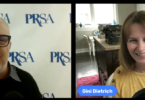
For each issue, the editors of Strategies & Tactics ask PRSA members a “Question of the Month.” In honor of September being PRSA’s Ethics Month, we posed the following: “What does acting ethically as a communicator mean to you?”
“Acting ethically as a communicator to me starts at a person’s core. A communicator who acts ethically is committing daily to morally practice with a level of excellence, advocacy, and fairness when someone is watching and then they are not.”
— TaQuinda Johnson
Social Media Specialist, University Marketing, Eastern Michigan University
Ypsilanti, Mich.
“We have a responsibility to ourselves and our employers to abide by ethical the standards as set by the PRSA Member Code of Ethics and the Page Principals of the Page Society. For me, these ethical standards are rooted in personal ethics applied to professional situations that are tested, applied and — hopefully — surpassed every day.”
— Mark Weiner
CEO, Prime Research Americas
New York
“It’s at the core of our responsibilities as strategic counselors. We need to be alert enough to ask the tough questions to ensure that the information we’re sharing is accurate, think about the potential consequences of our organization’s actions, share the concerns of key stakeholders with senior leaders, and have the moral imagination to identify ethical alternatives when necessary.”
— Marlene S. Neill, Ph.D., APR
Assistant Professor, Baylor University Department of Journalism, Public Relations and New Media
Waco, Texas
“It means practicing our craft with the highest standards of truth, accuracy, fairness and responsibility in all activities and communications.”
— Michael Smith
Corporate Director of Communications, Acts Retirement-Life Communities
West Point, Pa.







Having high professional standards and adhering to them.
I found this article very helpful and insightful. I love the idea that personal ethics is the main determinant of professional ethics as we cannot fully separate ourselves from the job. To me, ethics is a set of steadfast beliefs based on personal experience which influence action. This conversation got me thinking – how do we deal with ethical differences as they vary around the world? Can there ever be one set of standardized ethics?
This article was very interesting. Mostly encouraging for the future when I start my profession. Ethics is just beliefs but its up to you whether you want to follow certain ones. The best thing about it is you don’t have to follow any certain path. It does show others who you are as a person.. how do you choose the right path that others will accept?